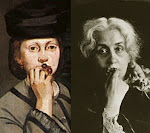
I was reading Roland Barthes's "Sade Fourier Loyola" wherein he wrote:
"...society cannot rest until it has guaranteed (how? Fourier has clearly explained it, but it must be admitted that it hasn't worked) the exercise of my manias, whether "bizarre" or "minor," like those people who like old chickens, the eater of horrid things (like the astronomer Lalande, who liked to eat live spiders), the fanatics about butter, pears, bergamots, Ankles, or "Baby Dolls".
Later I began to think about this statement. How is it that one of the things that history remembers about Lalande is his penchant for eating live spiders? Did he perform this feat for colleagues or at astronomical functions? Or was it something he recorded in a diary filled with shameful secrets in an era only just discovering something like “privacy”? And why did he like to eat them? Did he like to eat the small spiders that one sometimes sees scurrying across the pages of a book or the top of a desk – just as an alternative to smashing them or catching them and releasing them elsewhere? Or did he actually prepare them – large meaty spiders fried or with spices like one sometimes finds in markets in other countries besides France? Did people admire his courage or where they merely repulsed by a fetish they could not understand. Did he resort to eating them only as an old man during the Terror when a spider was the least of one’s troubles? So much is left out of this record.
Lalande had been a friend of the astronomer the Abbé Nicolas Louis de Lacaille (their years are 1732-1807 and 1713-1762 respectively). In the course of his lifetime the older Lacaille managed to catalogue some 10,000 southern stars as well as 42 nebulous objects. Among these nebulous objects was the Tarantula Nebula which Lacaille reclassified from a star in 1751. Lalande would have been 19 years old at the time.
If you have ever looked at a distant nebula through a simple telescope it appears as a faint and wispy luminosity ever trying to flee your sight and to re-submerge into the darkening cinders of space.
I imagine that there was a play of desire in Lalande’s joyful ingestion of spiders. Spiders weren’t ever-distant and ephemeral weightless glimmers visible only though the awkwardness of correctly aligned lenses, but in a way they were as fleeting and spindly and unknowable as nebulae. In catching and ingesting such a thing Lalande could imagine that the distance between the visible and the material could be bridged in an instant, laid claim too, and incorporated into one’s own being. And maybe at the age of 19 this dream was born in the metonymy of “Tarantula”.


1 comment:
questions i have had as well, regarding Lalande, and Barthes. Barthes, it seems, is discouraging a world that would make a mania of something so personal in the pursuit of pleasure as the consumption of spiders, just as Robert Walser, had he read your essay, would have reduced it to microscript and fed it to the closest cloud.
Post a Comment